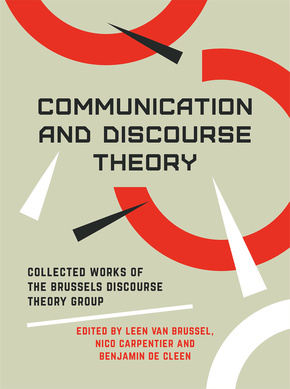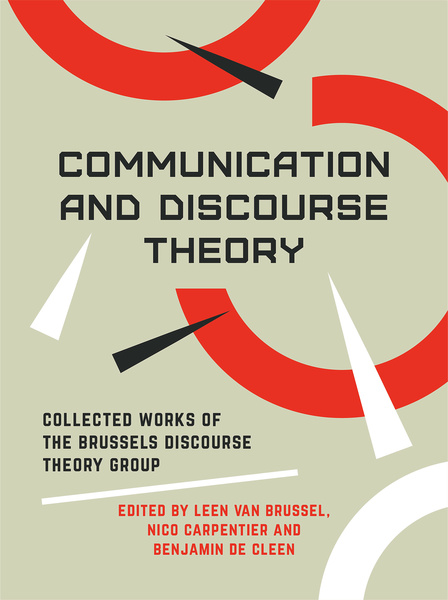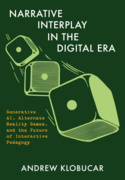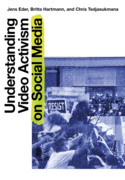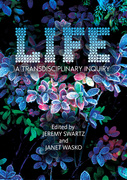Communication and Discourse Theory (Book)
Collected Works of the Brussels Discourse Theory Group
Drawing on a variety of case studies, ranging from the politics of reality TV to the representation of populism, Communication and Discourse Theory highlights both the radical contingent nature and the hegemonic workings of media and communication practices.
The introductory chapter 'Discourse Theory, Media and Communication, and the Work of the Brussels Discourse Theory Group' is available to download for free through Open Access. Click here for more information
Edition
This volume gathers the work of the Brussels Discourse Theory Group, a group of critical media and communication scholars that deploy discourse theory as a theoretical backbone and an analytical research perspective. The book seeks to show the value and applicability of discourse-theoretical analysis (DTA) within the field of media and communication studies, through a variety of case studies that highlight both the radical contingent nature and the hegemonic workings of media and communication practices.
Leen Van Brussel is a staff member of the Flemish Institute of Healthy Living (Vlaams Instituut Gezond Leven), where she works on health promotion ethics and health communication.
Nico Carpentier is associate professor in media and communication studies at the Department of Media Studies of Charles University in Prague.
Benjamin De Cleen is assistant professor at the Communication Studies Department of the Vrije Universiteit Brussel (VUB-Free University of Brussels) where he is the coordinator of the English-language master’s on journalism and media in Europe.
Introduction: Discourse Theory, Media and Communication, and the Work of the Brussels Discourse Theory Group
Nico Carpentier, Benjamin De Cleen, and Leen Van Brussel
Section 1: Political Ideologies
Chapter 1: Crisis, Austerity, and Opposition in Mainstream Media Discourses in Greece
Yiannis Mylonas
Chapter 2: (Re)Articulating Feminism: A Discourse Analysis of Sweden’s Feminist Initiative Election Campaign
Kirill Filimonov and Jakob Svensson
Chapter 3: The Stage as an Arena of Politics: The Struggle between the Vlaams Blok/Belang and the Flemish City Theatres
Benjamin De Cleen
Section 2: The Politics of Everyday Life
Chapter 4: A Discourse-Theoretical Approach to Death and Dying
Leen Van Brussel
Chapter 5: Putting Your Relationship to the Test: Constructions of Fidelity, Seduction, and Participation in Temptation Island
Nico Carpentier
Section 3: Production
Chapter 6: The Postmodern Challenge to Journalism: Strategies for Constructing a Trustworthy Identity
Jo Bogaerts and Nico Carpentier
Chapter 7: The Particularity of Objectivity: A Poststructuralist and Psychoanalytical Reading of the Gap between Objectivity-as-a-Value and Objectivity-as-a-Practice in the 2003 Iraqi War Coverage
Nico Carpentier and Marit Trioen
Section 4: Audiences and Participation
Chapter 8: The Articulation of “Audience” in Chinese Communication Research
Guiquan Xu
Chapter 9: Articulating the Visitor in Public Knowledge Institutions
Krista Lepik and Nico Carpentier
Chapter 10: To be a Common Hero: The Uneasy Balance between the Ordinary and Ordinariness in the Subject Position of Mediated Ordinary People in the Talk Show Jan Publiek
Nico Carpentier and Wim Hannot
Section 5: Activism and Resistance
Chapter 11: Online Barter and Counter-Hegemonic Resistance
Giulia Airaghi
Chapter 12: Activist Fantasies on ICT-Related Social Change in Istanbul
Itır Akdogan
Chapter 13: Contesting the Populist Claim on “The People” through Popular Culture: The 0110 Concerts versus the Vlaams Belang
Benjamin De Cleen and Nico Carpentier
Biographies
Previous Publications
'This work significantly contributes to research intersections on discourse and communication. [...] This book’s main contribution is to demonstrate that DT is employed in communication studies not from lack of attention but for its practicability, which represents a strong, systematic interpretation of communication practices. The authors fill methodological gaps with their analyses by explaining how the interpretative mechanisms underlying DT are operationalized. [...] The work further contributes by translating DT into a DTA methodology.'

